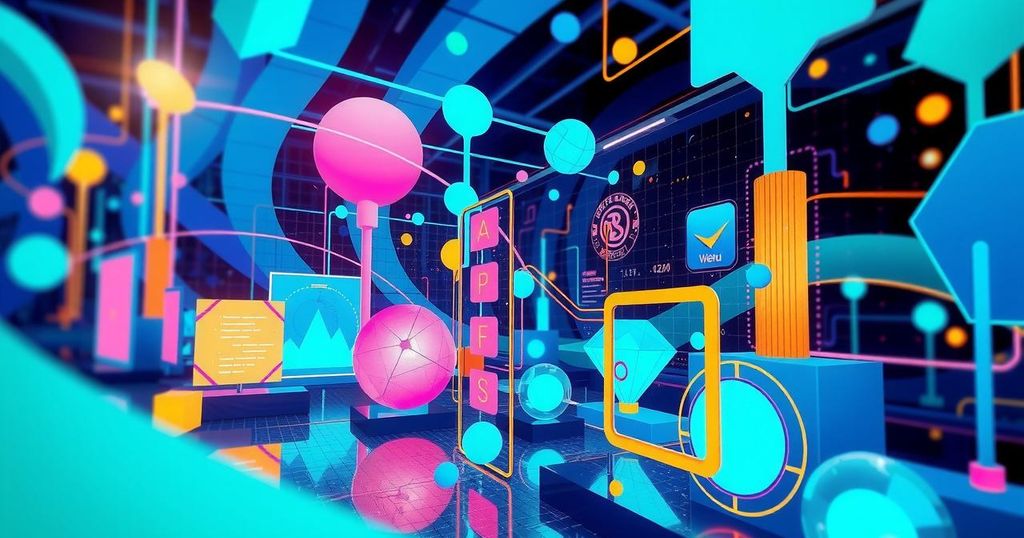Apple Heads into Annual Showcase Amid AI Missteps and Trade Concerns
Apple is approaching its Worldwide Developers Conference amid challenges stemming from AI missteps, regulatory pressures, and trade issues. The company will focus on software updates rather than major innovations, raising concerns about its competitive edge compared to rivals like Google and Samsung. Investors are anxious, as evidenced by a sharp drop in stock prices this year, marking a $750 billion loss in shareholder value.
Apple is set to face the music at its upcoming Worldwide Developers Conference (WWDC) as it grapples with a string of recent missteps, especially in the artificial intelligence realm. This annual event, which traditionally draws in thousands of developers to Apple’s headquarters in Silicon Valley, is expected to lack the usual excitement that has characterized the previous two years. Simply put, Apple is under pressure.
Last year’s conference saw Apple unveil the Vision Pro, its ambitious mixed-reality headset, yet that product has failed to achieve mass appeal. Moreover, Apple made a noteworthy push into AI with enhancements to Siri and other features, but now it’s contending with doubts about whether it has lost that innovative spark that once defined the brand. Industry insiders suggest Apple is pivoting its focus toward an updated software experience, aiming to revamp those native iPhone apps and perhaps even change the naming conventions of its operating systems.
Instead of trying to break new ground, it sounds like Apple is playing catch-up. Thomas Husson, an analyst from Forrester Research, believes that Apple still has room to grow in the AI space. “It’s more of a marathon than a sprint,” he noted. Major changes may come — for instance, a new naming strategy that could align iOS with the year it launches, which would label the upcoming iOS version as iOS 26 instead of 19.
Rumors have it that we might see this new operating system released for free this September, just in time to coincide with the next iPhone models, though it looks like Siri won’t be the star this time. Apple is reported to be less focused on AI compared to last year when it was the headline act. Despite launching some AI features alongside recent iPhone updates, Siri still hasn’t delivered on earlier promises, leading Apple to dial down its marketing push for the virtual assistant. Tim Cook, Apple’s CEO, acknowledged this delay, stating, “It’s just taking a bit longer than we thought. We are making progress…”
As competitors like Google and Samsung accelerate their AI developments, the gap between them and Apple is growing. Google has integrated AI more broadly in its Pixel smartphones and revamped its search engine, while Samsung continues its heavyweight push into AI applications. To complicate matters, ChatGPT recently struck a deal with Jony Ive, a former Apple design leader, to work on a device targeting the iPhone market.
Analysts continue to ponder the bigger picture, with questions swirling about what Apple will do next in a post-iPhone era. “What’s the next great thing after the iPhone?” poses Dipanjan Chatterjee from Forrester Research. Apple also has to contend with regulatory challenges that threaten substantial revenue. A judge is considering whether to restrict a $20 billion annual deal with Google, and another ruling has already limited Apple’s ability to collect commissions on in-app transactions.
On top of all this, Apple finds itself entangled in President Trump’s ongoing trade conflict with China, a crucial manufacturing center. Cook previously managed to steer clear of tariffs on iPhones, but the political landscape has shifted, making U.S.-based production a tougher road.
In light of these hurdles, investors are feeling skittish, leading to a drop in Apple’s stock price of nearly 20% this year, a staggering $750 billion loss in shareholder wealth. What was once a straightforward ascent to being the globe’s most valuable company has now been complicated by fierce rivalry from Microsoft and Nvidia, both strong players in AI.
Apple’s annual showcase arrives at a turbulent time, as the company struggles with recent AI setbacks, regulatory pressures, and trade issues. While the tech giant shifts its focus toward software updates and potential new strategic branding, it faces a growing divide in innovation compared to its rivals. Investors are understandably wary, which has led to significant losses for Apple this year. As it stands, the road ahead seems challenging for the brand that once set the pace for technological trends.
Original Source: apnews.com




